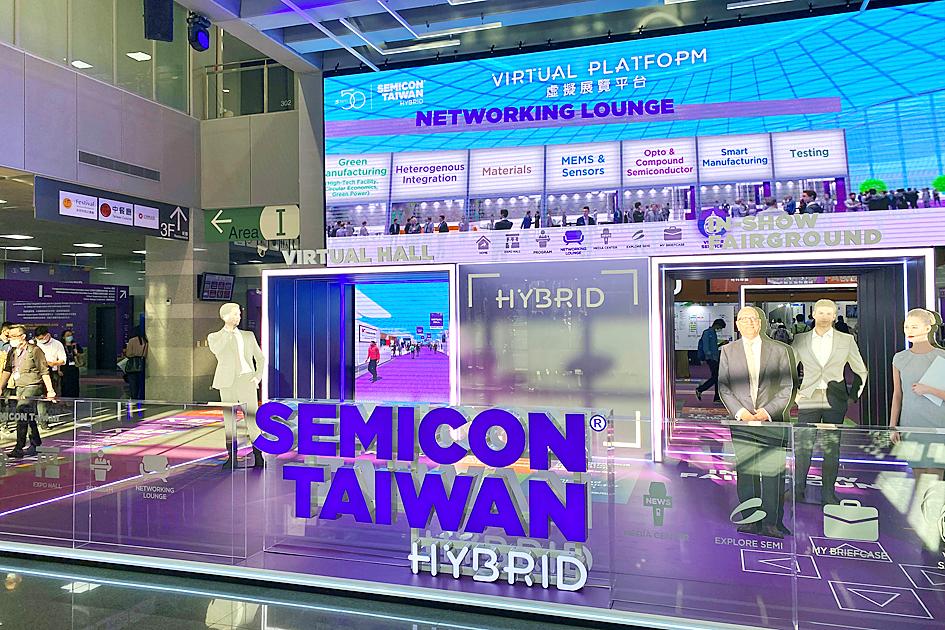Taiwan should join any global semiconductor supply chain alliance against China to protect its technological advantage and national security, according to Wang Che-jen (汪哲仁), an assistant research fellow at the government-funded Institute for National Defense and Security Research.
In a paper titled “Automotive chip shortage: A look at Taiwan’s strategic place in the semiconductor supply chain,” Wang wrote that a shortage of automotive chips has highlighted Taiwan’s strategic place in the global semiconductor industry.
The shortage shows that the supply chain for such products has become a matter of diplomatic, security and strategic concern, he added.

Photo: Ben Blanchard, Reuters
One of the ways technologically advanced nations are tackling the problem is by attracting foreign chipmakers to set up plants on their soil, Wang said.
The US and Japanese governments, for example, have invited Taiwan Semiconductor Manufacturing Co (TSMC, 台積電) to build facilities, he said.
However, Wang warned against such a move, saying that while it might help shorten global supply chains, it could also weaken Taiwan’s strategic advantage in the semiconductor industry.
“For Taiwan to maintain its ‘silicon shield,’ it needs to persuade European countries and the US that keeping TSMC in Taiwan is the best option,” he wrote.
Wang also warned that Taiwan should beware of China’s efforts to poach talent, given the latter’s goal of becoming 70 percent self-sufficient in chip production by 2025.
“Judging from experience, China’s poaching efforts will only increase,” he said.
Meanwhile, the US semiconductor industry has been urging US President Joe Biden’s administration to form a semiconductor alliance with like-minded countries to prevent technological espionage by China, he said.
The government should guide Taiwan’s technology companies to join such an alliance to protect the nation’s technological advantage and national security, Wang said.

TAKING STOCK: A Taiwanese cookware firm in Vietnam urged customers to assess inventory or place orders early so shipments can reach the US while tariffs are paused Taiwanese businesses in Vietnam are exploring alternatives after the White House imposed a 46 percent import duty on Vietnamese goods, following US President Donald Trump’s announcement of “reciprocal” tariffs on the US’ trading partners. Lo Shih-liang (羅世良), chairman of Brico Industry Co (裕茂工業), a Taiwanese company that manufactures cast iron cookware and stove components in Vietnam, said that more than 40 percent of his business was tied to the US market, describing the constant US policy shifts as an emotional roller coaster. “I work during the day and stay up all night watching the news. I’ve been following US news until 3am

UNCERTAINTY: Innolux activated a stringent supply chain management mechanism, as it did during the COVID-19 pandemic, to ensure optimal inventory levels for customers Flat-panel display makers AUO Corp (友達) and Innolux Corp (群創) yesterday said that about 12 to 20 percent of their display business is at risk of potential US tariffs and that they would relocate production or shipment destinations to mitigate the levies’ effects. US tariffs would have a direct impact of US$200 million on AUO’s revenue, company chairman Paul Peng (彭雙浪) told reporters on the sidelines of the Touch Taiwan trade show in Taipei yesterday. That would make up about 12 percent of the company’s overall revenue. To cope with the tariff uncertainty, AUO plans to allocate its production to manufacturing facilities in

Six years ago, LVMH’s billionaire CEO Bernard Arnault and US President Donald Trump cut the blue ribbon on a factory in rural Texas that would make designer handbags for Louis Vuitton, one of the world’s best-known luxury brands. However, since the high-profile opening, the factory has faced a host of problems limiting production, 11 former Louis Vuitton employees said. The site has consistently ranked among the worst-performing for Louis Vuitton globally, “significantly” underperforming other facilities, said three former Louis Vuitton workers and a senior industry source, who cited internal rankings shared with staff. The plant’s problems — which have not

COLLABORATION: Given Taiwan’s key position in global supply chains, the US firm is discussing strategies with local partners and clients to deal with global uncertainties Advanced Micro Devices Inc (AMD) yesterday said it is meeting with local ecosystem partners, including Taiwan Semiconductor Manufacturing Co (TSMC, 台積電), to discuss strategies, including long-term manufacturing, to navigate uncertainties such as US tariffs, as Taiwan occupies an important position in global supply chains. AMD chief executive officer Lisa Su (蘇姿丰) told reporters that Taiwan is an important part of the chip designer’s ecosystem and she is discussing with partners and customers in Taiwan to forge strong collaborations on different areas during this critical period. AMD has just become the first artificial-intelligence (AI) server chip customer of TSMC to utilize its advanced